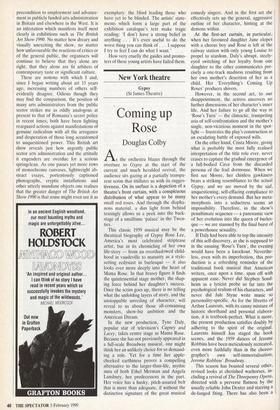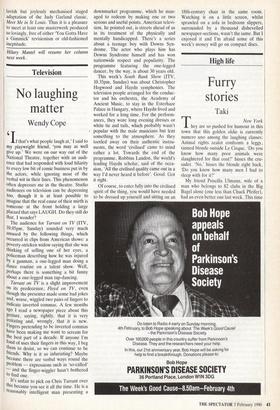New York theatre
Gypsy (St James Theatre)
Coming up Rose
Douglas Colby
As the orchestra blazes through the overture to Gypsy at the start of the current and much heralded revival, the audience sits gazing at a partially transpa- rent scrim that titillates us with its sugges- tiveness. On its surface is a depiction of a theatre's front curtain, with a conspicuous distribution of what appear to be many small red roses. And through the diapha- nous material, a dim light from behind teasingly allows us a peek into the back- stage of a smalltime 'palace' in the Twen- ties.
This classic 1959 musical may be the theatrical biography of Gypsy Rose Lee, America's most celebrated striptease artist, but in its chronicling of her own life-story — from an overshadowed child- hood in vaudeville to maturity as a style- setting ecdysiast in burlesque — it also looks ever more deeply into the heart of Mama Rose. In that brassy figure it finds the quintessential stage mother, the shap- ing force behind her daughter's success. Once the scrim goes up, there is no telling what the unfolding layers of story, and the unstoppable unveiling of character, will reveal to us about those all-consuming monsters, show-biz ambition and the American Dream.
In the new production, Tyne Daly, popular star of television's Cagney and Lacey, takes centre stage as Mama Rose. Because she has not previously appeared in a full-scale Broadway musical, one might think her an unlikely choice for so demand- ing a role. Yet for a time her apple- cheeked earthiness proves a compelling alternative to the larger-than-life, mythic aura of both Ethel Merman and Angela Lansbury, her predecessors in the part. Her voice has a husky, pitch-assured belt that is more than adequate, if without the distinctive signature of the great musical
comedy singers. And in the first act she effectively sets up the general, aggressive outline of her character, hinting at the demons within.
At the first-act curtain, in particular, when her favoured daughter June elopes with a chorus boy and Rose is left at the railway station with only young Louise to propel to stardom, Daly's abrupt, steely- eyed switching of her loyalty from one daughter to the other communicates pre- cisely a. one-track madness resulting from her own mother's desertion of her as a child. Her 'Everything's Coming Up Roses' produces shivers.
However, in the second act, to our disappointment, the actress uncovers no further dimensions of her character's inner life. And her failure to go all the way in 'Rose's Turn' — the climactic, trumpeting aria of self-confrontation and the mother's single, non-vicarious moment in the spot- light — frustrates the play's construction as an escalating battle of exposed wills.
On the other hand, Crista Moore, giving what is probably the most fully realised interpretation of the title role ever, never ceases to capture the gradual emergence of a full-bodied Circe from the discarded persona of the frail dormouse. When we first see Moore, her chinless gawkiness bears a striking resemblance to the actual Gypsy, and we are moved by the sad, unquestioning, self-effacing compliance to her mother's every demand. But her meta- morphosis into a seductress seems an impossibility. Therefore, in the show's penultimate sequence — a panoramic view of her evolution into the queen of burles- que — we are stunned by the final burst of a powerhouse sexuality.
If Daly had been able to top the intensity of this self-discovery, as she is supposed to in the ensuing 'Rose's Turn', the evening would have been a knockout. Neverthe- less, even with its imperfection, this pro- duction is a refreshing reminder of the traditional book musical that American writers, once upon a time, spun off with apparent ease. Never did Stephen Sond- heim as a lyricist probe so far into the psychological realism of his characters, and never did Jule Styne write music so personality-specific. As for the libretto of Arthur Laurents, with its canny mixture of historic shorthand and personal elabora- tion, it is textbook-perfect. What is more, the present production satisfies doubly by adhering to the spirit of the original. Laurents himself has staged the book scenes, and the 1959 dances of Jerome Robbins have been meticulously recreated, even more faithfully than in the choreo- grapher's own self-immortalisation, Jerome Robbins' Broadway.
This season has boasted several other, revised looks at cherished warhorses, in- cluding a revival of The Threepenny Opera, directed with a perverse flatness by the usually reliable John Dexter and starring a de-fanged Sting. There has also been a lavish but joylessly mechanised staged adaptation of the Judy Garland classic, Meet Me in St Louis. Thus it is a pleasure to meet at least one masterwork produced so lovingly, free of either 'You Gotta Have a Gimmick' revisionism or old-fashioned ineptitude.



















































 Previous page
Previous page